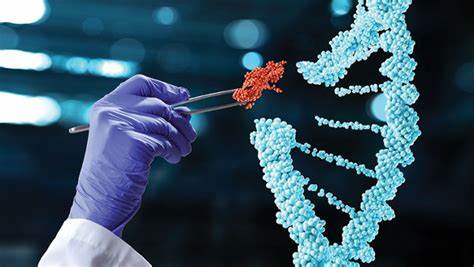The field of biotechnology is undergoing a revolutionary transformation, driven by breakthroughs in gene editing and biomedical technologies. These advancements hold the promise of revolutionizing healthcare, agriculture, and environmental conservation, among other fields. In this article, we’ll explore the innovative developments in gene editing and biomedicine that are shaping the future of biotechnology:
- Gene Editing Technologies: Gene editing technologies, such as CRISPR-Cas9, have revolutionized the field of molecular biology by enabling precise modifications to the genetic code of living organisms. CRISPR-Cas9 allows researchers to edit DNA sequences with unprecedented accuracy and efficiency, opening up new possibilities for treating genetic diseases, engineering crops, and developing novel therapeutics. By targeting specific genes associated with diseases, researchers can potentially correct genetic mutations and restore normal cellular function.
- Precision Medicine: The advent of gene editing technologies has paved the way for precision medicine, which involves tailoring medical treatments to individual patients based on their genetic makeup. By analyzing a patient’s genetic profile, doctors can identify genetic mutations that predispose individuals to certain diseases and develop personalized treatment strategies. For example, gene editing therapies hold the potential to cure genetic disorders such as sickle cell anemia and cystic fibrosis by correcting the underlying genetic defects.
- Cell and Gene Therapies: Cell and gene therapies represent a new frontier in medicine, offering innovative treatments for a wide range of diseases, including cancer, genetic disorders, and autoimmune diseases. These therapies involve modifying or manipulating cells or genes to treat or prevent disease. For example, CAR-T cell therapy uses genetically engineered immune cells to target and destroy cancer cells, while gene therapy aims to deliver functional genes to replace or supplement defective ones.
- Regenerative Medicine: Advances in biotechnology have fueled the development of regenerative medicine, which seeks to repair, replace, or regenerate damaged tissues and organs. Stem cell therapies, tissue engineering, and organ transplantation are among the approaches being explored to regenerate tissues and organs damaged by injury, disease, or aging. By harnessing the regenerative capacity of stem cells and leveraging tissue engineering techniques, researchers aim to develop new treatments for conditions such as spinal cord injury, heart disease, and diabetes.
- Bioinformatics and Data Analytics: The integration of bioinformatics and data analytics has become increasingly important in biotechnology, enabling researchers to analyze vast amounts of biological data and extract meaningful insights. By leveraging computational tools and algorithms, scientists can analyze genomic data, predict protein structures, and identify potential drug targets more efficiently. Bioinformatics also plays a critical role in drug discovery and development, accelerating the identification of novel therapeutics and reducing the time and cost of bringing new drugs to market.
- Ethical and Societal Implications: The rapid pace of innovation in biotechnology raises important ethical and societal questions regarding the implications of gene editing and biomedical technologies. Issues such as genetic privacy, equitable access to healthcare, and the potential misuse of biotechnologies must be carefully considered and addressed to ensure that the benefits of biotechnology are realized ethically and responsibly. It is essential to engage stakeholders, including scientists, policymakers, and the public, in discussions about the ethical and societal implications of biotechnological advancements.
- Future Directions: The future of biotechnology holds immense promise for further innovation and discovery. As gene editing technologies continue to evolve and become more precise, we can expect to see new breakthroughs in disease treatment, agriculture, and environmental conservation. Advancements in regenerative medicine, stem cell research, and tissue engineering may lead to new therapies for regenerating tissues and organs, transforming the treatment of chronic diseases and injuries. Additionally, the integration of artificial intelligence and machine learning techniques into biotechnology promises to accelerate the pace of discovery and innovation, unlocking new insights into the complexity of biological systems.
In conclusion, the biotechnology revolution is transforming the way we approach healthcare, agriculture, and environmental sustainability. By harnessing the power of gene editing and biomedical technologies, researchers are unlocking new possibilities for treating disease, improving crop yields, and protecting the environment. However, it is essential to address ethical, regulatory, and societal considerations to ensure that the benefits of biotechnology are realized ethically and responsibly. With continued innovation and collaboration, biotechnology has the potential to revolutionize our world and improve the lives of people around the globe.

